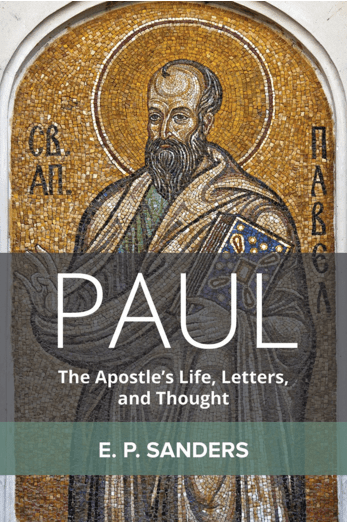The New Perspective argues that since Judaism was not a works religion, Paul was not opposing “works” righteousness. If everything in the old perspective flows out of the view that humans are merit-striving and if everything flows from a gospel that assaults human striving by replacing it with grace and faith, and if the new perspective is more accurate, then, well, lots of Paul’s theology deserves a more careful look. Which is why the works of Ed Sanders, Jimmy Dunn and Tom Wright are so much at the center of today’s debates. And since so much is at stake, we ought not be to surprised at the vehement reaction to the new perspective by some in the Reformed camp. Someone once told me he heard a well-known NT scholar say “Anyone who believes in the new perspective is not a Christian.” Well, that’s raising the flag, wouldn’t you say?
 Thanks to the fine efforts of James Beilby and Paul Rhodes Eddy, the book, Justification: Five Views (Spectrum Multiview Books), we have a book that sorts out the various views on justification in this new perspective debate today. We looked last week at Michael Horton’s traditional Reformed view, and today we look at Michael Bird’s “progressive” Reformed view.
Thanks to the fine efforts of James Beilby and Paul Rhodes Eddy, the book, Justification: Five Views (Spectrum Multiview Books), we have a book that sorts out the various views on justification in this new perspective debate today. We looked last week at Michael Horton’s traditional Reformed view, and today we look at Michael Bird’s “progressive” Reformed view.
Michael Bird is one of the bright young lights in the evangelical movement, but he’s not easy to box up into a predictable position. Michael wants more if more is to be had in the Reformed view; and he wants less if the Bible dictates less. So, in this post, he moves outside the box of Horton but is not with Dunn. He’s Reformed but he’s got a new perspective kind of Reformed theology of Paul. He takes “reformed and always reforming” seriously. Most Reformed don’t.
How does Bird’s take on justification strike you? Does it improve on Reformed thinking? Does it go far enough toward the new perspective? If not, where does it not go far enough?
He gets us started with this: “justification is the act whereby God creates a new people, with a new status, in a new covenant, as part of the first installment of the new age” (132). Paul’s emphasis in justification language — and here he parts ways with everyone in the traditional Reformed camp — “justification is Paul’s way of describing how the gospel saves Gentiles and brings them into the heritage of Israel” (133). “Works of the law,” so contested in this debate, “means works that the law requires, though in some contexts the laws that distinguish Jews from Gentiles” [there’s the more I spoke of above].
Here’s a ringer and I totally agree with Bird here: “justification by faith is not the gospel per se, rather, it is the mechanism that describes how the Gentiles can partake of those Abrahamic promises” (138). [I’m not convinced Michael is consistent on this one because he sees Jews needing justification too, so I want to say that Bird’s statement here is an attempt to mirror the emphasis in Paul’s theology.]
The “righteousness of God” in Romans 1:16-17 is subjective; it is not the gospel; it is not justification by faith; it is reducible to God’s covenant faithfulness. [Here he’s getting “more” again.]
He summarizes this discussion in ways that lead to greater nuance from that opening definition: God’s righteousness bursts into the world through the gospel about the Lord Jesus; there is no difference between Jews and Gentiles; it is God’s grace in putting all believers in a right relationship; is tied to the Abraham promise of bringing in Gentiles; it is rooted in God’s eschatological purposes.
What then of double imputation? Bird presses against how Reformed folks work this doctrine and says they are too medieval and too merit-based in how they conceive of double imputation. “righteousness… is not a property to be transferred, but a a status to be conferred” (147; my italics in this post). He is not convinced that even Romans 5:17-19 teaches much of what the Calvinist double imputation folks want it to teach. He pushes here against Piper. 1 Cor 1:30 is not imputational, reckoning language. And even 2 Cor 5:21 need not be: it might be that he “became” (not counted as) sin by bearing the load of sin on our behalf. There is no reference to Christ’s righteousness in imputation passages; there is no evidence his obedience was seen as merit; the big point is that by faith and in Christ we gain the status of righteous.
Bird drives home the centrality of union with Christ, not double imputation. For Horton the center is justification; the center of that is double imputation. Bird says, No, the center is union with Christ. He’s with Wright here in affirming union, but Bird wants “more”: imputation becomes “a necessary implicate” (151). In the end, I think Bird affirms something very close to the Reformed view of double imputation, but it is shorn of its medieval merit and active/passive obedience scholastic elements. He’s completely right here: union with Christ is more central, and Christ himself is even more central, and it is contact with Christ that does the work.
So we are back to five elements in justification: forensic; eschatological; covenantal; effective (it transforms); trinitarian.














